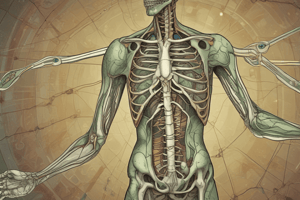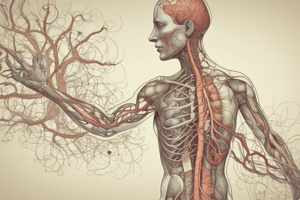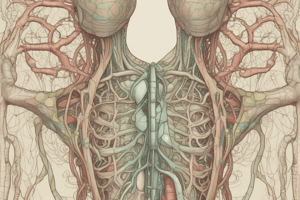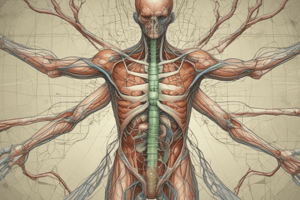Podcast
Questions and Answers
What are the primary sites where most immune responses occur?
What are the primary sites where most immune responses occur?
- Thymus and bone marrow
- Liver and intestines
- Thymus and kidneys
- Lymph nodes and spleen (correct)
What is the primary function of dendritic cells in the thymus?
What is the primary function of dendritic cells in the thymus?
- Store platelets
- Remove dead T cells
- Assist in T cell maturation (correct)
- Produce thymic hormone
Which of the following statements best describes the red pulp of the spleen?
Which of the following statements best describes the red pulp of the spleen?
- It primarily stores thymic hormone
- It consists mainly of T cells and B cells
- It is responsible for lymphocyte production
- It contains venous sinuses and splenic cords (correct)
How does the thymus function change with age?
How does the thymus function change with age?
What process leads to the removal of the majority of T cells in the thymus?
What process leads to the removal of the majority of T cells in the thymus?
What role do macrophages play in the spleen's red pulp?
What role do macrophages play in the spleen's red pulp?
What surrounds each lobe of the thymus?
What surrounds each lobe of the thymus?
What is a significant function of the spleen during fetal life?
What is a significant function of the spleen during fetal life?
What do lymphatic vessels have that distinguishes them from veins?
What do lymphatic vessels have that distinguishes them from veins?
Which lymphatic trunk drains the lower limbs and the pelvic wall?
Which lymphatic trunk drains the lower limbs and the pelvic wall?
Which major trunk is responsible for draining the stomach and intestines?
Which major trunk is responsible for draining the stomach and intestines?
What is the primary function of lymphatic vessels?
What is the primary function of lymphatic vessels?
What is the function of primary lymphatic organs?
What is the function of primary lymphatic organs?
What is lymph fluid described as?
What is lymph fluid described as?
How does lymph from the right upper body return to the circulatory system?
How does lymph from the right upper body return to the circulatory system?
Which vitamins are transported by the lymphatic system?
Which vitamins are transported by the lymphatic system?
What is the cisterna chyli?
What is the cisterna chyli?
What assists in the circulation of lymph?
What assists in the circulation of lymph?
Where do immature T cells undergo maturation?
Where do immature T cells undergo maturation?
Where are lymphatic capillaries located?
Where are lymphatic capillaries located?
The thoracic duct drains into which vein?
The thoracic duct drains into which vein?
What happens to lymph during exhalation?
What happens to lymph during exhalation?
What is the special term for lymphatic capillaries in the small intestine?
What is the special term for lymphatic capillaries in the small intestine?
Which of the following is NOT a component of the lymphatic system?
Which of the following is NOT a component of the lymphatic system?
What is the primary function of lymph nodes?
What is the primary function of lymph nodes?
Where are the largest groups of lymph nodes typically located?
Where are the largest groups of lymph nodes typically located?
What are the two main parts of the parenchyma in a lymph node?
What are the two main parts of the parenchyma in a lymph node?
What type of cells predominantly populate the inner cortex of a lymph node?
What type of cells predominantly populate the inner cortex of a lymph node?
Which statement is true regarding primary and secondary lymphatic nodules?
Which statement is true regarding primary and secondary lymphatic nodules?
What are tonsils primarily involved in?
What are tonsils primarily involved in?
What type of lymphatic tissue is referred to as MALT?
What type of lymphatic tissue is referred to as MALT?
Which of the following best describes the medulla of a lymph node?
Which of the following best describes the medulla of a lymph node?
Flashcards are hidden until you start studying
Study Notes
Components of the Lymphatic System
- Lymph is a clear, pale yellow fluid; in the intestines, it becomes milky (known as chyle) due to dietary lipids.
- Major components include lymph, lymphatic vessels, and lymphatic organs/tissues.
- Lymphatic vessels are crucial for draining excess interstitial fluid and transporting dietary lipids and fat-soluble vitamins A, D, E, and K to the bloodstream.
Lymph Circulation
- Lymph circulation is assisted by respiratory and skeletal muscle pumps, similar to venous blood flow.
- During inhalation, lymph flows from the abdomen to the chest; during exhalation, valves prevent backflow.
- Flow path: Blood capillaries → interstitial spaces → lymphatic capillaries → lymphatic vessels → lymph trunks/ducts → subclavian veins → superior vena cava → heart.
Lymphatic Vessels
- Lymphatic capillaries are located between cells, found throughout the body except in avascular areas, CNS, and red bone marrow.
- Special lymphatic capillaries called lacteals in the small intestines absorb dietary lipids.
- Lymphatic vessels resemble veins but have thinner walls and more valves, containing lymph nodes and following venous routes.
- Major lymph trunks include lumbar, intestinal, broncho-mediastinal, subclavian, and jugular trunks.
Lymphatic Ducts and Drainage
- The left side's lymph trunks combine to form the thoracic duct, draining into the left subclavian vein.
- The thoracic duct originates as cisterna chyli anterior to L2.
- The right side's lymph trunks drain directly into the right subclavian vein.
- Lymph from the right upper body returns through the right subclavian vein, while lymph from the left upper body and lower body returns via the left subclavian vein.
Lymphatic Organs and Tissues
- Primary lymphatic organs (red bone marrow and thymus) are where stem cells mature into immune cells.
- Secondary lymphatic organs (lymph nodes, spleen, lymphatic nodules) are sites for immune responses.
Thymus
- A bi-lobed organ located in the mediastinum, divided into lobules with an outer cortex and central medulla.
- Cortex is rich in T cells, supported by dendritic and epithelial cells, which produce thymic hormones for T cell maturation.
- Majority of T cells undergo apoptosis, with macrophages clearing the debris in the thymus.
- The thymus atrophies with age but populates secondary lymphatic organs with T cells before degeneration.
Spleen
- The largest lymphatic organ, encapsulated by dense connective tissue, containing white and red pulp.
- White pulp consists of lymphatic tissue with B cells, T cells, and macrophages, responsible for immune functions.
- Red pulp contains venous sinuses and cords, fulfilling functions like removing old blood cells, storing platelets, and producing blood cells during fetal development.
Lymph Nodes
- Bean-shaped structures containing B and T cells, approximately 600 are distributed along lymphatic vessels.
- Lymph enters through afferent vessels and exits via efferent vessels, filtering foreign substances.
- The parenchyma is divided into cortex (outer and inner) and medulla, with distinct immune cell populations.
Lymphatic Nodules
- Egg-shaped masses of lymphatic tissue, can be primary (natural) or secondary (response to antigens).
- Found in mucous membranes lining the GIT, urinary and reproductive tracts, also known as mucosa-associated lymphatic tissue (MALT).
- Tonsils (5 varieties) play a role in protecting against inhaled or ingested pathogens, located at junctions of oral and nasal cavities.
Studying That Suits You
Use AI to generate personalized quizzes and flashcards to suit your learning preferences.




